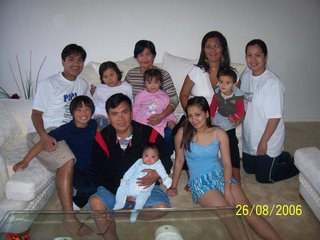Before...

after 11 years...

With our new members (one still to come!)

There are many occasions in the Gospel when people come to Jesus to ask him questions. The Gospel last Monday, if you remember is about the story of the rich young man who asked Jesus how to gain eternal life. In today’s Gospel, a lawyer or a student of the Law is the questioner of Jesus.
Unlike the rich young man who sincerely asked Jesus on how to gain eternal life, the lawyer approached Jesus “to test” him by asking which commandment in the law is the greatest. According to most commentaries, this person represents the Pharisees who want to distinguish and select from some 613 laws and commands of the Torah the first and the greatest commandment. Knowing well his questioner’s intentions Jesus refuses to play the Pharisees’ attempt to catch him in a mistake.
Jesus’ answer to his question is not a categorical answer stating the greatest commandments. Rather, he gives the double commandment of love that can summarize the Law and the Prophets, the meaning of life, and the entire Gospel: to love God with all our heart and all our soul and all our mind, and to love our neighbours as ourselves.
The first commandment calls us to remember part of the Jewish profession of faith, the Shema: “Love the Lord your God with all your might.” And this reminds us that to love God with all our heart…soul and mind.. is more than a feeling or emotion but it is a matter of faithfulness and commitment, both in words and actions. Since God is truth and goodness itself, and since he has loved us with everlasting love, we ought to love him above all creatures and with our entire being.
The command to love God has as its inseparable counterpart the command to love neighbour. To love one’s neighbour as oneself means to love him as we should love ourselves. We must love our neighbour as ourselves because they too are children of God, they carry in their soul the image of God, they have human dignity, and like us, our neighbour are destined for eternal union with God through love. This reminds us that the best way to understand how we can love God and how God loves us and how to pray is to think in terms of a relationship based on charity.
Jesus teaches us that charity is the greatest and first commandment because he whom we are to love is God, infinitely perfect, containing within himself all beauty, truth, goodness and love, because the purpose of all the commandments is our union with God in love. If we fail to observe charity, we fail in all, for all other commandments reduce themselves to charity.
So as men who are preparing for the priesthood, let us pray that God will increase his grace upon us and help us to love him with all our heart soul and mind in every circumstances of our life. Let us also pray that our desire to follow his Son, our Lord, may be transformed into a pure love, which is faithfulness and commitment, both in words and actions.
* Adapted from the story of Fr. Ben San Luis SVD